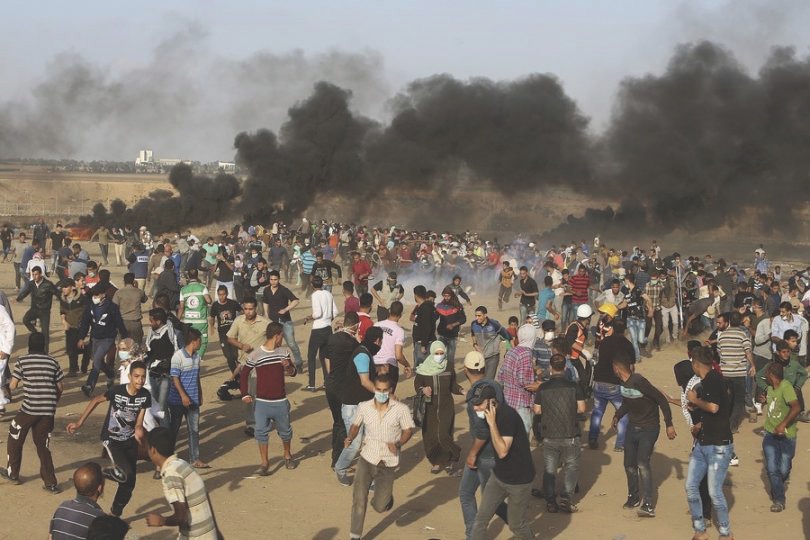
A proposal drafted by Kuwait to deploy an international force to protect Palestinians along the border between Israel and the Gaza Strip currently is circulating among member-states of the United Nations Security Council. This, after the U.N. Human Rights Council (UNHRC) voted overwhelmingly to establish a commission of inquiry into allegations of possible war crimes committed by the Israeli military during the recent chaos along the frontier, which resulted in the deaths of at least 60 Gazans and injuries to some 2,000. Kuwait also pushed for the Security Council to adopt a statement expressing “outrage and sorrow at the killing of Palestinian civilians” and reiterating the call for an independent investigation, although the United States vetoed the move.
In response, Israel’s U.N. ambassador issued a statement decrying the “shameful … attempts to distort reality,” while declaring that Israel’s military “will continue to defend its sovereignty and the security of its citizens against the terror and murderous violence of Hamas.” Israeli Prime Minister Benjamin Netanyahu called the UNHRC a “biased body whose goal is to harm Israel and to back terrorism.”
Indeed, many independent observers have agreed with Israel’s supporters regarding what they see as elements of hypocrisy in the international community’s treatment of Israel when viewed against the backdrop of the carnage taking place in the Yarmouk Palestinian refugee camp, located south of Damascus, where Syrian regime forces have for weeks been waging a fierce campaign against the Islamic State (ISIS). The camp was once home to more than 200,000 Palestinians, yet today only a few thousand remain, many on the brink of starvation. An estimated 4,000 Palestinian civilians have been killed during the Syria civil war, more than the combined death toll in all of Israel’s conflicts with Hamas over the past decade.
Despite this seemingly abject abuse of Palestinian refugees, there are no concerted calls for any probes into the ongoing devastation in Yarmouk, nor is Syrian President Bashar Assad in the crosshairs of the International Criminal Court despite clear evidence that he has perpetrated crimes against humanity by repeatedly using chemical weapons against his own citizens.
In the same vein, ISIS, arguably one of the most insidious terrorist groups of modern times, is virtually being ignored vis-à-vis its Yarmouk travesties in stark contrast to the across-the-board condemnations of the ISIS massacre of Yazidis in Iraq, for example. This apparent “exception” blurs another peculiar reality: namely, the widely drawn distinction between ISIS and Hamas, even though both are incarnations of the same radical Sunni Islamic ideology.
That Kuwait is leading the drive to place Israel in the docket is also paradoxical given that it expelled some 400,000 Palestinians during and after the first Gulf War because of former Palestinian chief Yasser Arafat’s support at the time for Iraqi leader Saddam Hussein.
While it is clear to many that Israel is not without responsibility and that its policies have contributed to Palestinian suffering, many also assert that decades of attributing blame exclusively to the Jewish state for all Palestinian suffering has in no way furthered the Palestinian cause.
“The question is not whether the response from the international community is right or wrong, but if it solves the problem,” according to Maj. Gen. (Res.) Nathan Sharony, president of the Tel Aviv-based Council for Peace and Security, which promotes a sustainable political solution to the Israeli-Palestinian conflict. “And the only way to do so,” he told The Media Line, “is to elevate the standard of living in Gaza from the absolute minimum to something substantial. Once the people are relieved from the daily trouble they are experiencing they have something to lose and their motivations become different.
For Israelis, the singular focus on the Jewish state’s alleged crimes only reinforces their world-against-us mentality.
“Years have gone by, though, and there has been nothing but military collisions,” Sharony concluded, “so with no water and no electricity the situation in the Strip has become critical and needs to be solved now. This has to be an international effort, but Israel has to show that it means business.”
But a growing number of sources suggest that the UNHRC offers merely symbolic condemnations of Jerusalem, which, predictably, reacts with Pavlovian-like fury, while the U.S. is forced to go it alone and defend its ally by wielding its veto power in the Security Council. In other words, the status quo is effectively propagated, thereby ensuring that the cycle of violence repeats itself, even as other causes of Palestinian suffering are obfuscated.
This includes, for instance, the obvious deleterious impact of Hamas’ iron-fist rule, manifest in the crushing of all internal dissent and the pursuit of an external strategy of unending war, which, taken together, greatly reduces the possibility of improving the humanitarian situation in the enclave and thus the lives of Palestinians. Also overlooked are the millions of Palestinians who continue to languish in refugee camps throughout the Middle East — as opposed to being integrated into their host countries — a reality that has denied them any personal agency, thus leaving them totally vulnerable to assaults such as in Yarmouk.
For Israelis, the singular focus on the Jewish state’s alleged crimes only reinforces their world-against-us mentality, which, in turn, expresses itself through increasingly right-wing governments with more and more members that reject Palestinian statehood outright.
According to Gershon Baskin, an expert on Israeli-Palestinian affairs, “what we are seeing is a lot of the same-old, same-old because there are not many viable options. The international community is trying to figure out how to address the humanitarian situation in Gaza but, given the rivalry between Hamas and the PA [Palestinian Authority] and the fact that many countries do not deal with [the former] as it is considered a terrorist organization, there is only so much that can be done.
“I don’t see any solution coming from the U.S., Europe or, of course, Israel,” he told The Media Line. “One possible initiative could come from the Arab world, such as when countries sent a joint force to Lebanon to end the civil war there.”
Many agree that a change of approach is sorely needed. But as things stand, the headlines about Gaza will, as they have in the past, inevitably be pushed to the back pages. Given historical precedent, Israel will have weathered the storm and be left as it was, if not stronger because of its growing economic and military clout coupled with the diplomatic protection afforded by its alliance with the U.S.
The Palestinians, meanwhile, will have little to show other than additional suffering.






















 More news and opinions than at a Shabbat dinner, right in your inbox.
More news and opinions than at a Shabbat dinner, right in your inbox.